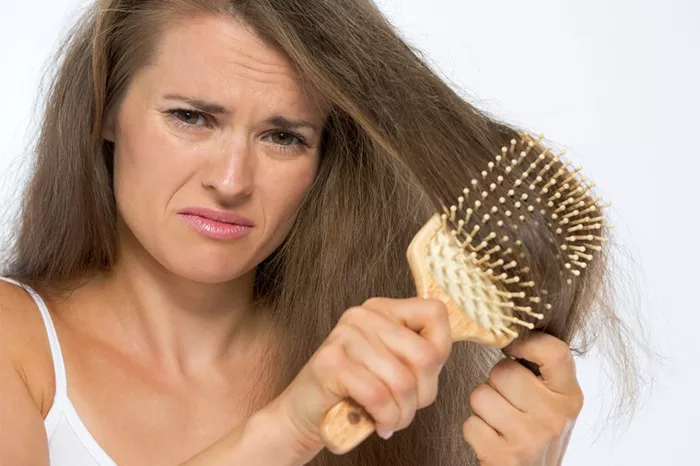Dry hair can be frustrating and challenging to manage. Understanding the root causes of dry hair can help you address the issue effectively. One significant factor that can lead to dry hair is nutritional deficiency. In this article, we will explore various deficiencies that can cause dry hair and offer solutions to manage and prevent it.
The Role of Nutrition in Hair Health
Hair is made up of a protein called keratin. For hair to be healthy, it needs proper nourishment. Various vitamins and minerals play a critical role in maintaining hair health. When your body lacks these essential nutrients, it can lead to dry, brittle, and unhealthy hair.
Vitamin Deficiencies
Vitamin A
Vitamin A is crucial for the production of sebum, an oily substance that keeps your scalp moisturized. Sebum acts as a natural conditioner for your hair. A deficiency in vitamin A can lead to a dry, flaky scalp, which in turn causes dry hair.
Sources of Vitamin A:
Carrots
Sweet potatoes
Spinach
Kale
Apricots
Vitamin E
Vitamin E is known for its antioxidant properties, which help reduce oxidative stress in the scalp. Oxidative stress can damage hair follicles, leading to dry and brittle hair. Vitamin E also aids in maintaining the oil balance on the scalp.
Sources of Vitamin E:
Almonds
Sunflower seeds
Spinach
Avocados
Peanuts
Vitamin D
Vitamin D deficiency is linked to hair loss and dry hair. Vitamin D plays a role in creating new hair follicles. A lack of this vitamin can hinder the development of new hair, leading to thinning and dryness.
Sources of Vitamin D:
Sunlight exposure
Fatty fish (salmon, mackerel)
Fortified milk
Egg yolks
Mushrooms
Mineral Deficiencies
Iron
Iron is vital for the production of hemoglobin, which carries oxygen to your hair follicles. An iron deficiency can result in poor oxygenation of hair follicles, causing them to become weak and dry. This condition is commonly known as anemia.
Sources of Iron:
Red meat
Poultry
Beans
Lentils
Spinach
Zinc
Zinc plays a crucial role in hair tissue growth and repair. It also helps keep the oil glands around the hair follicles working properly. A deficiency in zinc can lead to hair loss, dry hair, and a flaky scalp.
Sources of Zinc:
Meat
Shellfish
Legumes
Seeds
Nuts
Omega-3 Fatty Acids
Omega-3 fatty acids are essential fats that your body cannot produce on its own. They provide essential oils that keep your scalp and hair hydrated. A deficiency in omega-3 fatty acids can result in dry, brittle hair and a flaky scalp.
Sources of Omega-3 Fatty Acids:
Fatty fish (salmon, trout)
Flaxseeds
Chia seeds
Walnuts
Soybeans
Protein Deficiency
Hair is primarily made up of protein. A lack of protein in your diet can lead to weak, brittle, and dry hair. Ensuring you have enough protein intake is crucial for maintaining hair health.
Sources of Protein:
Meat
Poultry
Fish
Eggs
Dairy products
Legumes
Nuts
Hydration and Hair Health
Water is essential for overall health, including the health of your hair. Dehydration can lead to dry hair. Ensuring you drink enough water daily can help keep your hair hydrated and healthy.
SEE ALSO: How Often Should You Wash Bleached Hair?
Other Contributing Factors
Hormonal Imbalances
Hormonal imbalances, such as those caused by thyroid problems, can lead to dry hair. The thyroid gland regulates many body functions, including hair growth. An underactive thyroid (hypothyroidism) can cause hair to become dry and brittle.
Managing Hormonal Imbalances:
Regular check-ups with a healthcare provider
Medications as prescribed
A balanced diet rich in nutrients
Environmental Factors
Environmental factors like exposure to harsh weather, excessive use of hair styling tools, and chemical treatments can strip your hair of its natural oils, leading to dryness.
Protecting Your Hair:
Use heat protectant sprays when using styling tools
Limit the use of chemical treatments
Wear hats or scarves to protect your hair from the sun and wind
Tips to Combat Dry Hair
Regular Trims
Getting regular trims helps prevent split ends and keeps your hair looking healthy. Split ends can travel up the hair shaft, making your hair look dry and frizzy.
Gentle Hair Care Routine
Using a gentle shampoo and conditioner designed for dry hair can make a significant difference. Avoid shampoos with harsh sulfates, which can strip your hair of its natural oils.
Hair Care Routine:
Wash your hair with lukewarm water
Use a moisturizing shampoo and conditioner
Apply a leave-in conditioner or hair oil
Deep Conditioning Treatments
Deep conditioning treatments provide extra moisture to your hair. You can use store-bought deep conditioners or make your own using natural ingredients like avocado, honey, and coconut oil.
Healthy Diet
Maintaining a balanced diet rich in vitamins, minerals, and proteins is essential for healthy hair. Including a variety of nutrient-dense foods in your diet can help combat dryness and improve the overall health of your hair.
Hydration
Drinking plenty of water is crucial for keeping your hair hydrated. Aim for at least eight glasses of water a day to ensure your body, including your hair, stays well-hydrated.
Avoid Over-Washing
Washing your hair too frequently can strip it of its natural oils, leading to dryness. Try to wash your hair two to three times a week, depending on your hair type and lifestyle.
Conclusion
Dry hair can be a sign of underlying nutritional deficiencies or other health issues. By ensuring you get enough essential vitamins, minerals, and proteins, you can improve the health and appearance of your hair. Additionally, adopting a gentle hair care routine, protecting your hair from environmental damage, and staying hydrated can help keep your hair moisturized and healthy.
If you continue to experience dry hair despite making these changes, consider consulting with a healthcare provider or a dermatologist. They can help identify any underlying issues and provide personalized recommendations to improve your hair health.

